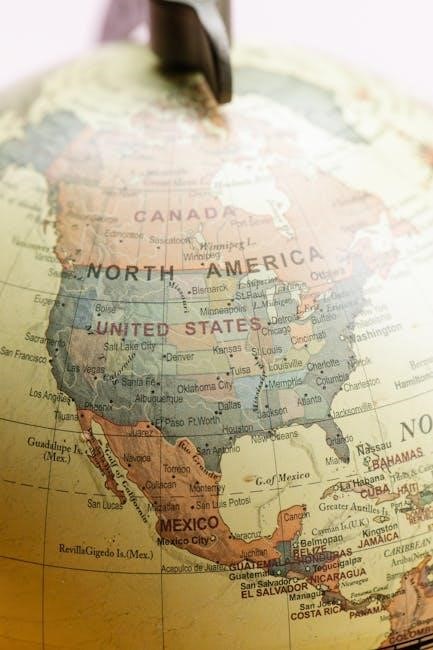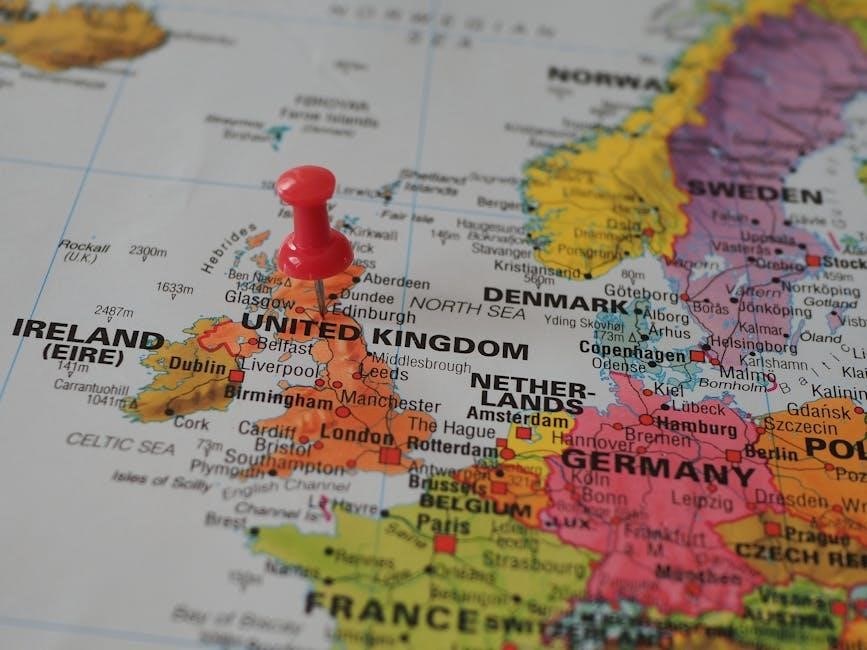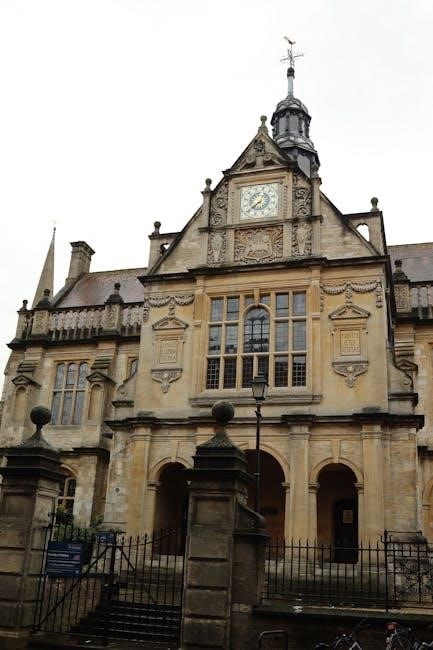AP World History Unit 5 covers global transformations from the Industrial Revolution to political revolutions and globalization. It emphasizes key themes‚ inventions‚ and social changes‚ while providing study strategies for success.
1.1. Overview of Unit 5
Unit 5 of AP World History explores global transformations from the Industrial Revolution to the rise of modern political and economic systems. It covers industrialization‚ political revolutions‚ and globalization‚ highlighting key inventions‚ social changes‚ and the spread of Enlightenment ideas. Students analyze cause-and-effect relationships‚ cultural shifts‚ and environmental impacts. This unit prepares learners to understand the interconnectedness of global processes and their enduring legacies‚ equipping them with critical thinking and analytical skills essential for success in historical inquiry.
1.2. Key Themes and Concepts
Unit 5 focuses on industrialization‚ political revolutions‚ and globalization. Key themes include the causes and consequences of the Industrial Revolution‚ the rise of nationalism‚ and the spread of Enlightenment ideas. Students explore how technological advancements‚ economic systems‚ and cultural shifts shaped global connections. The unit also examines the role of imperialism‚ environmental impacts‚ and demographic changes. Understanding these concepts requires analyzing primary sources‚ identifying patterns‚ and evaluating the legacies of these transformations in shaping the modern world.

The Industrial Revolution
The Industrial Revolution‚ originating in Britain‚ transformed technology‚ economy‚ and society. It introduced mechanized production‚ fossil fuel reliance‚ and urbanization‚ reshaping global industries and labor systems fundamentally;
2.1. Causes of the Industrial Revolution
The Industrial Revolution was driven by Britain’s abundant natural resources‚ such as coal and iron‚ and its extensive network of harbors and rivers; A large labor supply‚ agricultural improvements‚ and technological innovations also played crucial roles. Additionally‚ Britain’s stable political climate and growing middle class provided the capital necessary for investment in factories and machinery. These factors combined to create a perfect storm that initiated the Industrial Revolution‚ setting the stage for global economic transformation.
2.2. Key Inventions and Innovations
The Industrial Revolution was marked by groundbreaking inventions that transformed industries. The steam engine‚ developed by James Watt‚ revolutionized manufacturing and transportation. The spinning jenny and power loom enhanced textile production‚ increasing efficiency. The steam locomotive and telegraph enabled faster transportation and communication. These innovations not only boosted productivity but also laid the foundation for modern industrial society‚ driving economic growth and societal change on a global scale.
2.3. Social and Economic Impact
The Industrial Revolution reshaped societies and economies‚ fostering urbanization and the growth of a factory-based workforce. New social classes emerged‚ with industrialists accumulating wealth while workers often faced harsh conditions. Economic systems shifted toward capitalism‚ driven by mass production and technological advancements. This period also saw the rise of consumer culture and global trade networks‚ further integrating the world economy and laying the groundwork for modern economic structures.
Political Revolutions and Changes
Unit 5 explores the French Revolution‚ other European uprisings‚ and their global impact. Key themes include the rise of nationalism‚ the end of feudalism‚ and the emergence of modern nation-states.
3.1. The French Revolution
The French Revolution (1789–1794) was a pivotal event shaped by Enlightenment ideas‚ financial crisis‚ and social inequality. Key causes included the burden of taxation on the Third Estate and the influence of libertarian ideals. The Revolution began with the Estates-General and the Storming of the Bastille‚ symbolizing the end of absolute monarchy. Radical phases‚ such as the Reign of Terror‚ led to the execution of King Louis XVI and Marie Antoinette. The Revolution culminated in the rise of Napoleon Bonaparte‚ leaving a lasting impact on European politics and the spread of democratic ideals globally.
3.2. Other European Revolutions
Beyond France‚ other European revolutions emerged in the 19th century‚ driven by nationalism and liberalism. The Belgian Revolution (1830) led to independence from the Netherlands‚ while the German and Italian revolts aimed for unification. The Revolutions of 1848‚ or “Springtime of Nations‚” swept across Europe‚ advocating for democratic reforms and national unity. Though many faced suppression‚ these movements reshaped political landscapes and inspired future struggles for independence and self-governance‚ leaving a lasting legacy in European history and global political development.
3.3. Impact on Global Politics
The French Revolution and other European revolutions inspired similar movements worldwide‚ spreading Enlightenment ideas like liberty and equality. Nationalist sentiments surged‚ influencing independence movements in Latin America and beyond. These revolutions challenged traditional monarchies and empires‚ reshaping global political structures. The rise of democratic ideals and self-determination became central to modern nation-building‚ leaving a lasting impact on global governance and the pursuit of political reform in the 19th and 20th centuries.

Globalization and Economic Systems
Globalization in this period saw the expansion of global trade networks‚ driven by imperialism and capitalism. Economic systems transformed‚ with industrialization and colonial exploitation shaping global wealth distribution and power dynamics.
4.1. The Rise of Capitalism
The rise of capitalism during this period was fueled by industrialization‚ private ownership‚ and market-driven economies. Key factors included the accumulation of capital‚ technological advancements‚ and the emergence of a wage-based labor system. Capitalism reshaped global economic structures‚ fostering innovation but also leading to inequality. It became a dominant force‚ influencing political and social systems across the world‚ particularly in Europe and North America.
4.2. Global Trade Networks
Global trade networks expanded significantly during this period‚ driven by industrialization and imperialism. New technologies‚ such as steamships and railroads‚ facilitated the movement of goods and raw materials. European empires played a central role in establishing and controlling these networks‚ often exploiting colonies for resources. This led to a more interconnected global economy‚ with trade routes spanning across continents. However‚ this system also perpetuated inequality‚ as wealth and resources flowed disproportionately to industrialized nations‚ shaping global economic and social dynamics for centuries to come.
4.3. The Role of Imperialism
Imperialism played a pivotal role in shaping global economic systems by expanding European empires’ control over colonies. European powers sought raw materials‚ markets‚ and strategic advantages‚ often through exploitative practices. This led to the extraction of resources‚ labor exploitation‚ and the imposition of foreign cultures. Imperialism also fostered resistance and nationalism in colonized regions‚ contributing to long-term underdevelopment. The global power dynamics established during this period reinforced inequality and shaped the modern world’s economic and political structures‚ leaving lasting legacies in both colonizing and colonized nations.

Cultural and Social Transformations
This section explores the rise of nationalism‚ shifts in family and gender roles‚ and the spread of Enlightenment ideas‚ shaping societies globally during this transformative period.
5.1. Nationalism and Its Role
Nationalism emerged as a powerful force during the 18th and 19th centuries‚ shaping political revolutions and movements. It emphasized national identity‚ sovereignty‚ and unity‚ influencing events like the French Revolution and the unification of Italy and Germany. Nationalism often led to conflicts but also fostered pride and solidarity among people. Its role in reshaping global politics and societies remains a critical focus for understanding modern state formations and ideologies.
5.2. Changes in Family and Gender Roles
During the Industrial Revolution‚ urbanization altered family dynamics as people moved to cities for work. Traditional gender roles shifted with women and children entering factory jobs. This led to changes in family structures and social norms. New challenges arose in balancing work and domestic life‚ reshaping societal expectations around gender and family responsibilities.
5.3. The Spread of Enlightenment Ideas
The Enlightenment emphasized reason‚ individual rights‚ and liberty‚ influencing political and social change. Philosophers like Rousseau‚ Voltaire‚ and Locke spread these ideas through writings and salons. Their concepts challenged traditional authority‚ inspiring reforms and revolutions globally. The French Revolution exemplified their impact‚ promoting democratic ideals. The spread of Enlightenment ideas laid the foundation for modern democracy and human rights‚ reshaping global politics and culture. This period marked a significant shift in societal values‚ enduring as a cornerstone of contemporary thought.
Technological Advancements
Major innovations like steam engines‚ railroads‚ and telegraphs revolutionized industries and societies‚ fostering global connectivity and economic growth during the Industrial Revolution and beyond.
6.1. Major Technological Developments
The Industrial Revolution introduced groundbreaking technologies such as the steam engine‚ spinning jenny‚ and power loom‚ which transformed textile production and industrial processes. The development of the telegraph enabled rapid communication over long distances‚ while advancements in metallurgy and engineering led to the construction of railways and steamships. These innovations not only increased productivity but also facilitated global trade and the movement of people‚ laying the foundation for modern industrial society.
6.2. The Impact of Technology on Society
Technological advancements during the Industrial Revolution profoundly reshaped society. Urbanization accelerated as people moved to cities for factory jobs‚ leading to the growth of industrial centers. New technologies improved living standards but also created social inequalities‚ as factory workers faced harsh conditions. The rise of capitalist economies and global trade networks further transformed societal structures. Additionally‚ technological innovations spurred environmental changes and influenced cultural shifts‚ laying the groundwork for modern industrialized societies. These developments had lasting effects on labor‚ family life‚ and global connections.
Environmental and Demographic Changes
Environmental factors like coal and iron availability fueled industrialization‚ while population growth and urbanization transformed societies‚ creating new social hierarchies and resource challenges.
7.1. Environmental Factors in Industrialization
Environmental factors played a crucial role in the Industrial Revolution. Britain’s abundance of coal and iron ore provided essential resources for industrial production. Rivers and harbors facilitated transportation‚ enabling the movement of raw materials and finished goods. Additionally‚ agricultural improvements increased food production‚ supporting population growth. However‚ industrialization also led to environmental degradation‚ including air and water pollution‚ deforestation‚ and soil depletion. These environmental changes had long-term impacts on ecosystems and human health‚ shaping the trajectory of industrial development globally.
7.2. Population Growth and Urbanization
Population growth and urbanization were significant consequences of industrialization. Improved agriculture and medicine led to increased life expectancy‚ spurring population growth. As industries expanded‚ people moved to cities for work‚ causing rapid urbanization. Cities like Manchester and Birmingham grew exponentially‚ creating new social systems. However‚ urbanization also brought challenges‚ such as overcrowding‚ poor sanitation‚ and inadequate housing. This transformation reshaped societal structures‚ fostering the development of a working class and influencing political and economic systems globally.

Study Tips and Strategies
Effective studying involves memorizing key ideas‚ utilizing flashcards‚ and practicing essay questions. Focus on understanding themes and patterns rather than just dates and events.
8.1. Effective Studying for Unit 5
Effective studying for Unit 5 requires a structured approach. Focus on understanding key themes‚ such as industrialization‚ revolutions‚ and globalization. Use flashcards to memorize important terms and concepts. Practice essay questions by outlining responses and reviewing rubrics. Engage in active reading by summarizing chapters and identifying patterns. Dedicate time to analyzing primary sources and graphs. Regularly review notes and textbook material to reinforce learning. Utilize practice tests to assess understanding and identify areas for improvement. Prioritize critical thinking and connections between historical events.
8.2. Key Resources and Materials
Essential resources for Unit 5 include the official AP World History study guide‚ online flashcards‚ and practice tests. Utilize College Board materials‚ such as past exams and scoring guides‚ to familiarize yourself with the format. Supplement your studies with textbooks like World History: Patterns of Interaction and digital platforms like Khan Academy. Engage with primary sources and historical documents to deepen your understanding. Regularly review concept outlines and timelines to track progress and identify gaps in knowledge. These tools will help you master Unit 5 content effectively.
